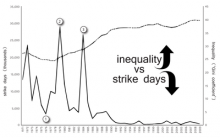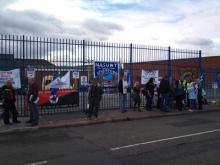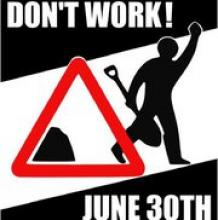Graphed: strike days versus inequality
High-res version here.
1. Labour call in the International Monetary fund (IMF), marking the end of the post-war setttlement and the beginning of rising inequality. This came despite several years of the TUC agreeing to hold down pay.
2. Workers respond with a wave of strikes, many of them unofficial. These culminate in the ‘Winter of discontent’ in 1978/9.
3. Thatcher’s Tory government smashes the workers’ movement, leading to a dramatic fall in strike days and a corresponding rise in inequality.


